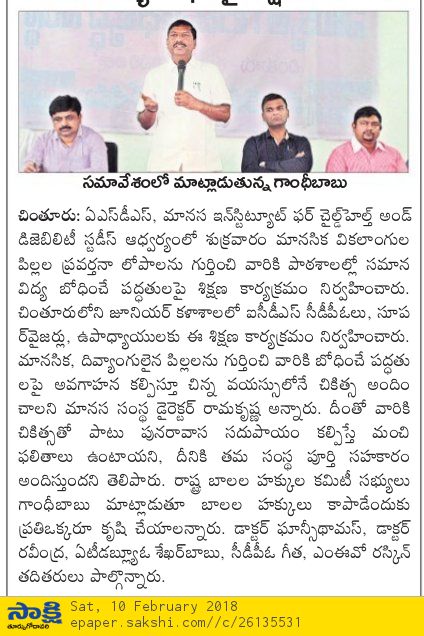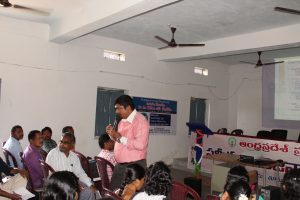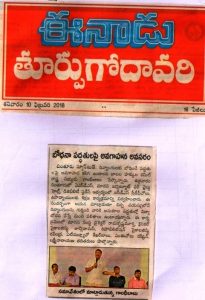Training in-service Teachers on Inclusive Education for the Children with Disabilities at Chintur, E. Godavari, A.P. on 09/02/2018

In collaboration with 
(Rekhapallivill. , V. R. PuramMdl. E. Godavari Dist., A.P.)
Objectives:
- Provide information on the basics of screening and identification of special children
- Foster knowledge and skills on assessment ofchildren with special needs
- Involve the participants in designing Inclusive Education Plan for Children with special needs
- Offer techniques and strategies on class room management for the Inclusive Education.
| Time | Session | Speaker |
| 10.00 | Introduction to Education of Children with Disabilities | Sri R. Ramakrishna Murthy
Director, MICHADS.
|
| 12.00 | Screening and Identification Children with Disabilities
& Parental Counselling & Referral Services |
Shri B. Ravindra,
Rehabilitation Psychologist |
| 1.30 | LUNCH | |
| 2.00 | Nature and Scope of Inclusive Education | Sri R. Ramakrishna Murthy
Director, MICHADS.
|
| 3.00 | Behavioral aspects of SEN Children and Classroom management
|
Dr.JohnseyThomus,
Clinical Psychologist
|
| 4.30 | Clarifications & Feedback
|
__ |
| 5.00 | Vote of thanks &Valedictory | Sri Gandhibabu,
Member, AP State Commission for Protection of Child Rights
|
The ‘Manasa Institute of Child Health Disability Studies’ (MICHADS) Hyderabad promotes child health and rights, inclusion and empowerment of persons with disabilities and families through training, research and community services. As a part of the institute’s need based interventions this programme has been designed.
According to World Health Organisation,bout 15% of the world’s population lives with some form of disability, of whom 2-4% experience significant difficulties in functioning.Disability is a leading cause of marginalization in education, with enrollment, primary school completion and literacy rates consistently falling below those of non-disabled children (Groce and Bakhshi, 2011; UNESCO, 2010). children with disabilities are less likely to attend or remain in school, have lower transition and completion rates and do not achieve the levels of results of their peers (WHO, 2011). Many factors compound to make the situation difficult for children with disabilities to succeed in formal education. Being a girl, having a particular impairment or condition, or coming from a poor household are all additional risk factors for poor educational attainment (Le Fanu, 2014). ‘Disability’ and ‘Lack of education’ forms a vicious circle, which can be broken only by suitable rehabilitation intervention inclusive education as main component in it.
Inclusive education means education of all students, where all students are equal participants in the learning process. Provision of inclusive education involving students with disabilities is based on the belief that those with disabilities should not have to depend on specialised services alone, to benefit from educational resources, activities and practices that are otherwise available to all. Inclusivity is maintained when all members of a group are able to participate in its activities, which means, provisions made are considerate of all members and not just those from specific groups or, with special abilities, disabilities, and/or needs.







